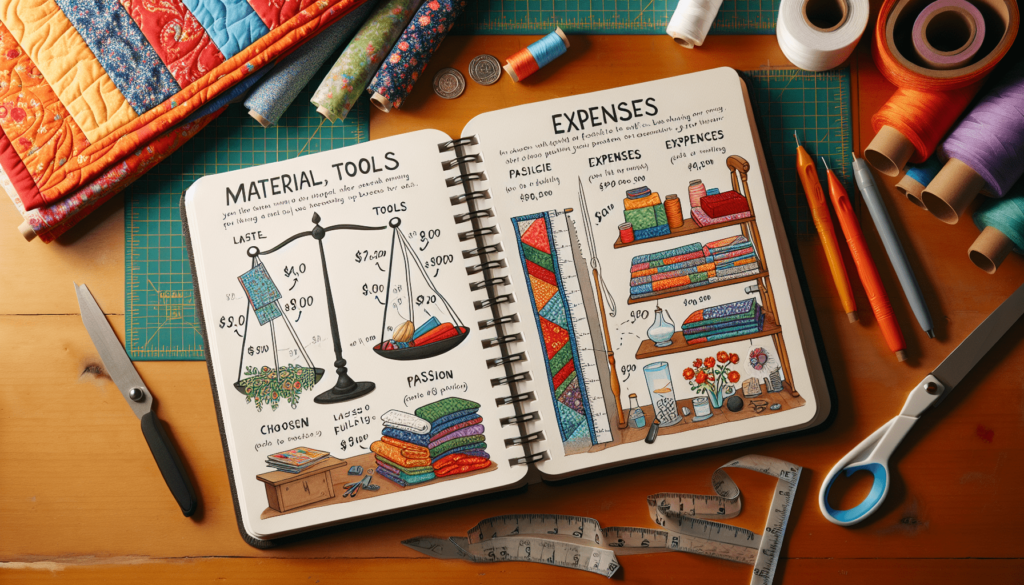Welcome to the insightful discussion on whether quilting is indeed an expensive hobby. While the cost of quilting can vary depending on various factors such as materials, tools, and techniques, it is possible to enjoy this creative craft without breaking the bank. By exploring budget-friendly options, DIY projects, and utilizing resources wisely, you can indulge in the art of quilting without worrying about a hefty price tag. Let’s dive into the world of quilting and discover how you can make it an affordable and enjoyable hobby.
“Is Quilting An Expensive Hobby?”
If you’ve ever been interested in quilting but have hesitated due to concerns about costs, you’re not alone. Many people wonder if quilting is an expensive hobby. In this article, we’ll break down the costs involved in quilting to give you a better understanding of whether or not it’s an expensive pursuit.

Understanding the Costs of Quilting
Quilting, like any hobby, can range from budget-friendly to quite expensive depending on various factors. Understanding the potential costs involved in quilting can help you make an informed decision about whether to pursue this creative endeavor.
Quilting involves several key components, each with its associated costs. These components include fabric, tools, patterns, batting, thread, and embellishments. Let’s take a closer look at each of these elements to understand their costs and impact on your overall quilting budget.
Fabric
Fabric is one of the primary costs associated with quilting. The type, quality, and quantity of fabric you choose will significantly impact your overall expenses. High-quality quilting fabric can be quite expensive, especially if you opt for designer prints or specialty fabrics.
When starting out, you may want to consider purchasing fabric in pre-cut bundles, such as fat quarters or jelly rolls, to save money and reduce waste. Shopping sales, using coupons, and joining fabric clubs can also help lower your fabric costs.
Tools
Quilting requires a variety of tools to help you cut, piece, and finish your projects. Some essential quilting tools include rotary cutters, cutting mats, rulers, and sewing machines. While these tools can be a significant initial investment, they are essential for quilting success.
You can save money on quilting tools by purchasing them gradually as needed and looking for sales or discounts. Investing in high-quality tools can also help you save money in the long run by avoiding the need to replace inferior products.
Patterns
Quilting patterns come in a wide range of styles and complexities, from simple beginner patterns to intricate designs. The cost of quilting patterns can vary depending on the designer and complexity of the design.
To save money on patterns, consider using free patterns available online or in quilting magazines. You can also create your designs or modify existing patterns to suit your preferences without the need to purchase new patterns.
Batting
Batting is the material sandwiched between the layers of fabric in a quilt that provides warmth and structure. The cost of batting can vary depending on the type of material, loft, and size needed for your project.
Consider shopping sales or using coupons to save money on batting. You can also repurpose old blankets or duvets as batting to reduce costs and minimize waste.
Thread
Thread is another essential quilting supply that can impact your overall expenses. High-quality thread is critical for securing seams and ensuring the longevity of your quilts.
Look for thread sales or discounts to save money on this quilting essential. Consider investing in a thread collection with a variety of colors to reduce the need to purchase individual spools for each project.
Embellishments
Embellishments such as buttons, beads, and ribbons can add extra interest and detail to your quilting projects. While embellishments are optional, they can add to the overall cost of your quilting endeavors.
Consider using supplies you already have on hand or repurposing items from thrift stores or craft sales to save money on embellishments. You can also get creative with fabric scraps or embroidery to add unique touches to your quilts without breaking the bank.
Tips for Budget-Friendly Quilting
While quilting can be an expensive hobby, there are several ways to enjoy this creative pursuit on a budget. By following these tips, you can make quilting more affordable and accessible.
1. Start Small
When beginning quilting, start with simple projects and gradually work your way up to more complex designs. By starting small, you can build your skills and confidence without investing a significant amount of money in supplies.
2. Purchase Supplies Strategically
Before buying quilting supplies, make a list of what you need for your current project. Avoid impulse purchases and stick to your list to prevent overspending.
3. Shop Sales and Discounts
Take advantage of sales, discounts, and coupons to save money on fabric, tools, patterns, and other quilting supplies. Sign up for newsletters or follow quilting stores on social media to stay informed about special offers.
4. Use What You Have
Before buying new supplies, take inventory of what you already have on hand. Repurpose fabric, batting, and embellishments from previous projects to save money and reduce waste.
5. Join a Quilting Group
Joining a quilting group or club can provide opportunities to share supplies, swap fabric, and participate in group purchases to save money. Quilting groups also offer support, advice, and inspiration for your quilting journey.

Conclusion
In conclusion, quilting can be an expensive hobby, but it doesn’t have to break the bank. By understanding the costs involved in quilting, making strategic purchases, and following budget-friendly tips, you can enjoy this creative pursuit without overspending. Whether you’re a seasoned quilter or a beginner looking to get started, quilting can be a rewarding and fulfilling hobby that brings joy and creativity into your life. Happy quilting!

